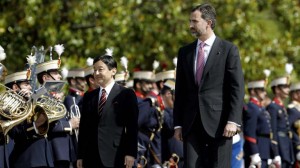
Good news from Tokyo this week, where French President François Hollande used the occasion of a state visit to Japan to announce that the Eurozone crisis is over.
So, that’s alright then.
Mr Hollande developed his up-beat thesis by asserting that the recent unpleasantness will result in long-term benefits, as it has led to banking union, as well as better economic governance and better intra-government coordination.
At which point less ebullient observers might be forgiven for sounding a cautionary note – that it may lead to these desirable things but hasn’t conclusively done so, at least not yet. The worst (if you take a very optimistic view) could be over, but basic disagreements over crisis (and post-crisis) management remain.
The French president chose an appropriate platform for breezy confidence, since the new Japanese government is pumping money into what has been for two decades a chronically sluggish economy in an effort to generate recovery, an expensive approach that may be closer to the preferred French strategy than the preferred German one.
In an effort to square this circle, starting with a summit in Rome on Friday (14 June), senior ministers from France, Germany, Italy and Spain are trying to forge a continental job-creation strategy that doesn’t get bogged down in the trench warfare of austerity versus growth.
Labour flexibility
In this and other venues Germany and Spain will champion labour flexibility, but in France (and, for that matter, in Japan), labour flexibility is routinely viewed as a euphemism for low pay and temporary contracts. One way of addressing this perception would be to spread the pain – though senior executives may be reluctant to lead by example.
A study just published by the Federation of European Employers has found that CEOs in Italy and Spain are the highest paid out of 47 countries and territories in Europe, and that the recession has only exacerbated the unhealthy disparity between the best paid and the worst paid (which may raise questions about Mr Hollande’s idea of better economic governance).
Senior Spanish executives have to manage on an average hourly rate of €788, a bit behind their Italian counterparts but well ahead of executives from European economies doing considerably better than Spain. By comparison, the average hourly rate for a secretary working at a Spanish multinational was €12.41.
These figures suggest that labour flexibility might usefully be extended beyond the millions of people on minimum pay.
Things change
Worth noting, perhaps, that 20 years ago, when the Japanese economy was a global powerhouse and US business was in the doldrums, Japanese executives earned a fraction of the salaries commanded by their counterparts in failing American multinationals.
One visitor to Spain who is no doubt familiar with this cultural and economic disparity is Japan’s Crown Prince Naruhito, who met members of the Japanese community in Madrid this week and members of the Spanish royal family before travelling on to Seville and Santiago de Compostela.
There is a considerable physical disparity between the respective heirs to the Spanish and Japanese thrones. One is very tall and the other is rather short. This, though, did nothing to dent the uplifting spectacle of blue-blooded camaraderie. There is also a disparity between the two countries’ relative economic strength, but, as Crown Prince Naruhito may have considered when he officiated at the launch of the Japan-Spain Business Cooperation Council, things change.
On Prince Naruhito’s itinerary was the town of Coria del Rio just outside Seville, where the first Japanese diplomatic mission to Spain (or anywhere else) sailed into port in 1614. It’s worth remembering that these travellers from the east headed for Spain because it was the richest and most powerful country in the world at the time.
The country’s subsequent decline is routinely attributed to a failure to identify and understand the changes taking place in the global market. British and Dutch merchants (not all of them on astronomical salaries) were better at spotting opportunities and better at funding start-ups.
So, no shortage of valuable messages to be read into bilateral visits this week – of European dignitaries to Japan and Japanese dignitaries to Europe, not to mention the less glamorous but just as important deliberations of finance and labour ministers in Rome.
To read more by Anna Maria O’Donovan visit My Spanish Interlude.
Leave a Reply
You must be logged in to post a comment.